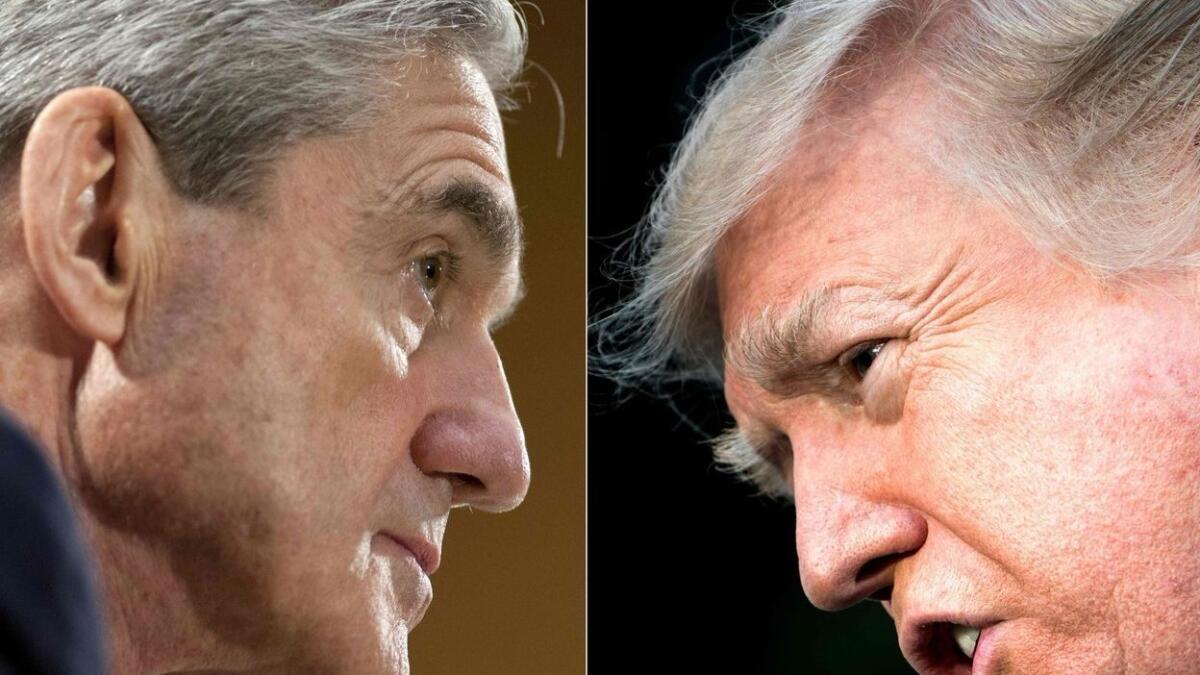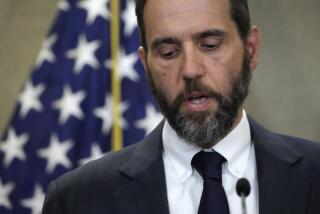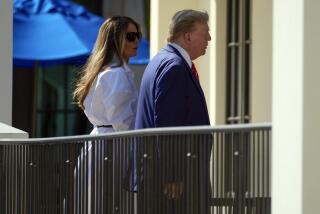Without mentioning Mueller, Trump lawyers urge high court to bolster his power to fire executive officials

The Supreme Court is set to hear a seemingly minor case later this month on the status of administrative judges at the Securities and Exchange Commission, an issue that normally might only draw the interest of those accused of stock fraud.
But the dispute turns on the president’s power to hire and fire officials throughout the government. And it comes just as the White House is saying President Trump believes he has the power to fire special counsel Robert S. Mueller III.
Trump’s Solicitor Gen. Noel Francisco intervened in the SEC case to urge the high court to clarify the president’s constitutional power to fire all “officers of the United States” who “exercise significant authority” under the law.
“The Constitution gives the president what the framers saw as the traditional means of ensuring accountability: the power to oversee executive officers through removal,” he wrote in Lucia vs. SEC. “The president is accordingly authorized under our constitutional system to remove all principal officers, as well as all ‘inferior officers’ he has appointed.”
In addition to representing the administration before the Supreme Court, Francisco, a former law clerk for the late Justice Antonin Scalia, could be in line to oversee the Mueller inquiry if Deputy Atty. Gen. Rod Rosenstein is fired. Atty. Gen Jeff Sessions has recused himself from the investigation.
Peter Shane, a law professor at the Ohio State University, called Francisco’s argument a “radical proposition,” and one that goes beyond what is at issue in the case. The justices said they would focus only on how the SEC in-house judges are appointed. But Francisco is asking them to go further and rule on the “removal” issue.
“The solicitor general is obviously trying to goad the court into a broad statement about the removability of all officers of the United States,” Shane said. “Were the court to make any such statement, it would surely be cited by Trump as backing any move by him to fire Mueller directly.”
For decades, constitutional experts have fundamentally disagreed about the balance of power between Congress and the president.
Many of them, especially liberals, argue that because Congress has “all legislative powers,” it can structure the government as it sees fit, including by creating independent agencies that are not under the president’s direct control.
But others, mostly conservatives, adhere to what is sometimes called the “unitary executive” theory. They argue that because the Constitution puts executive power in the hands of one president, he is thereby entitled to hire and fire all those who wield significant executive authority.
Francisco points to two provisions of the Constitution as giving the president very broad authority. One says the president shall appoint ambassadors, judges and “all other officers of United States.” The other says the president “shall take care that the laws be faithfully executed.”
“The president’s constitutional responsibility to faithfully execute the laws requires adequate authority to remove subordinate officers,” Francisco told the court in February. “The framers understood the close connection between the president’s ability to discharge his responsibilities as head of the executive branch and his control over its personnel…. The president’s ability to execute the law is thus inextricably linked to his authority to hold his subordinates accountable for their conduct.”
Francisco’s defense of broad presidential power is likely to win favor with Chief Justice John G. Roberts Jr. and the court’s other conservatives. In 2010, Roberts spoke for a 5-4 majority that struck down a provision in the Sarbanes-Oxley Act, which created an independent public accounting board at the SEC whose members could be fired only for “good cause.”
Roberts said shielding these “officers of the United States” from presidential control was unconstitutional. “Since 1789, the Constitution has been understood to empower the president to keep these officers accountable — by removing them from office, if necessary,” he wrote in Free Enterprise Fund vs. Public Company Accounting Oversight Board.
The new SEC case is similar, though it involves hiring, not firing. The commission relies on administrative law judges who act as hearing officers when people or companies are accused of deceptive schemes involving stocks. In the past, they were chosen by the chief in-house judge based on merit, and they could be fired only for good cause.
The SEC accused Raymond Lucia of marketing a deceptive wealth-management strategy called “Buckets of Money.” After a nine-day hearing, an administrative law judge decided Lucia had misled investors and recommended a civil penalty of $300,000. The SEC itself made the final decision, but Lucia appealed, contending the procedure for choosing the administrative judges was unconstitutional.
The Obama administration defended the SEC, arguing these in-house judges were mere employees, not officers of the United States, because they had no final decision-making power. But the U.S. Court of Appeals in Washington, D.C., split 5 to 5 on the issue.
Last year, Trump’s lawyers switched sides and joined in challenging the SEC’s approach as unconstitutional. This was in line with the conservative backlash against the so-called “administrative state,” which includes an effort to bring these agencies and their employees under presidential control.
In January, the high court agreed to decide the “Appointments Clause” question, but Francisco filed a brief urging the court to also rule that such “officers” may be removed if they fail to “perform adequately.”
Lawyers who have followed the case predict the justices will try to decide the SEC dispute narrowly and without signaling their views on the president’s potential control over the special prosecutor at the Justice Department.
Mueller was appointed under department regulations that say the special counsel may be removed only for “misconduct, dereliction of duty, incapacity, conflict of interest or for other good cause.” Under those rules, only Rosenstein currently would have the power to fire Mueller. Some lawyers argue that the regulations have the force of law and would prevent Trump from directly firing Mueller.
But Francisco’s brief suggests the administration lawyers believe the Constitution itself authorizes the president to remove officials who wield executive power in the government. Last week White House Press Secretary Sarah Huckabee Sanders said the administration had been advised that the president has the power to fire the special counsel.
On Friday the court agreed to Francisco’s request to participate in the April 23 argument so he can advocate for a ruling on the president’s removal power.
More stories from David G. Savage »
On Twitter: DavidGSavage
More to Read
Get the L.A. Times Politics newsletter
Deeply reported insights into legislation, politics and policy from Sacramento, Washington and beyond. In your inbox three times per week.
You may occasionally receive promotional content from the Los Angeles Times.







